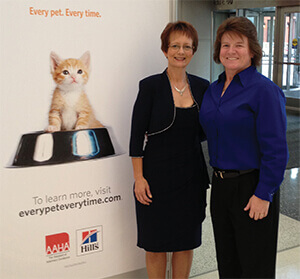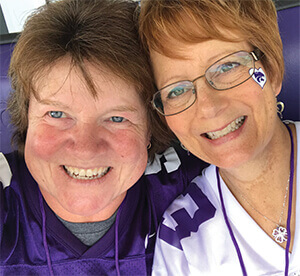Kara Burns, MS, MEd, LVT, VTS (Nutrition) currently has two loves. One of those loves is her wife, Dr. Ellen Lowery, and the other is veterinary nutrition. That’s right, nutrition.
“I realized the importance of nutrition as I witnessed the difference proper nutrition makes in our patients,” she says. “Many veterinary professionals don’t talk about the topic, and it’s been my mission to change that.”
Indeed, Burns is a force to be reckoned with. She speaks around the world and consults practices. Her passion is palpable when you listen to her. Burns is all about passion. “Passion is what makes life worth living, and I admire people who have it. I think everyone has a passion for something, they just need to find it. I think technicians tend to be very passionate, otherwise they wouldn’t have pursued this career.”
It’s a career in which Burns, past president of NAVTA and editor–in–chief of Today’s Veterinary Nurse, has irrefutably achieved success. At 54, veterinary technology wasn’t Burns’ first career.
In college Burns excelled in field hockey and women’s softball, as well as in her majors of Education and Psychology at the University of Maine. A self–admitted perfectionist, Burns has always been about living her best life. Her job out of graduate school was a psychologist in the emergency department of Maine Medical Center in Portland. She also worked extra shifts answering poison control questions, and many of those questions were about pets.
A combination of factors led her to veterinary medicine. She grew up with many pets in the home, and it’s a career that, deep inside, she always wanted to pursue. Simultaneously, there was a certain frustration with what she was doing.
“I was dealing with emergencies, psychotic breaks and people on the verge of suicide, and there were not enough resources to help individuals in need. And that was difficult,” expressed Burns.
So, Burns took a leap of faith —leaving a “decent income” for a five–dollar–an–hour job in the early 1990’s as a vet assistant. Five years later, she passed the Veterinary Technician National Exam. “Oh, I loved it from the start,” she says.
And then along the way, a veterinarian she worked for noted her passion in nutrition and let her run with it. And run with it she did. Burns is a founder of the veterinary technician specialty and the Academy of Veterinary Nutrition Technicians.
In 2004, she was transferred to Topeka by Hills Pet Nutrition as a veterinary technician specialist, and moved half way across the country to Kansas. Burns admitted that she did have second thoughts. “Oh absolutely, I mean, moving to Topeka from the state I love. But there was an almighty plan.”
It turned out, that move changed her life in two ways. This is about the time that Burns, who was once reluctant about public speaking, launched her speaking career. The other was meeting the love of her life, and it was what Burns today says was love at first sight.
Burns isn’t typically all too effusive about her emotions. But her face lights up when you mention Ellen. Today, Lowery is a professor at Kansas State University, Olathe.
Burns says, “I never thought about coming out because I was always out; I was never in,” she laughed. “I’m lucky because I believe the veterinary profession is more accepting than others. I think it’s that we’re all pretty empathetic.”
Burns though realizes that being “out” isn’t so easy in many practices. She’s on the Board and is Treasurer of the Pride Veterinary Medical Community (formerly the Lesbian and Gay Veterinary Medical Association). Pride VMC offers support to the LGBTQ+ community.
“Receiving support from colleagues in the same place you are at is enormously helpful,” she says. “What do you say to co–workers? Do you come out? And what do you say to clients, even in making casual conversation?”
Burns is all about change when it’s the right thing to do. And that also refers to the change from veterinary technician to veterinary nurse. “It’s not just a name change, veterinary nurse provides a better understanding to pet owners regarding our role on the team and the training that credentialed technicians receive.” She adds that the days of hiring well–intentioned but under–qualified animal lovers who have little or no formal veterinary education and calling them technicians has to stop. And the profession needs standardized credentialing.
Having a background in psychology, Burns is qualified more than most to comment on the depression and suicide rate within the profession. “I don’t know that we can solve this on our own,” she says. “I think we would benefit by professional psychological intervention within the profession, beginning with the veterinary schools—and that is starting to happen. Admitting the problem and openly discussing it is a very good start. Mental health is as important as physical well–being; they go hand in hand, but there remains a stigma to mental health. The focus has been on veterinarians, when the entire team is impacted. We’ve been talking about it, and now we’re beginning to offer resources.”
Lowery and Burns have three children, ranging in age from 18 to 30 years old, and two granddaughters. They now live in their recently–built dream home, shared with an assortment of critters, starting with Fribble, a French Bulldog (who Burns says “is the best dog ever, ever”), an Australian Shepherd/Border Collie–mix named Brees; two domestic shorthair cats, Oreo and Baby; a Snowshoe named O’Malley and Ollie the Persian (“the best cat ever”). Also, there is a guinea pig named Nugget, Bella the Meyer’s parrot and Loki the green–cheeked Conure. Their six finches are new and, to date, unnamed (although, as a group, they answer to the ‘Minions’). And finally, the two lovebirds Juno and Sookie—though some suggest Kara and Ellen might have been as suitable. +



